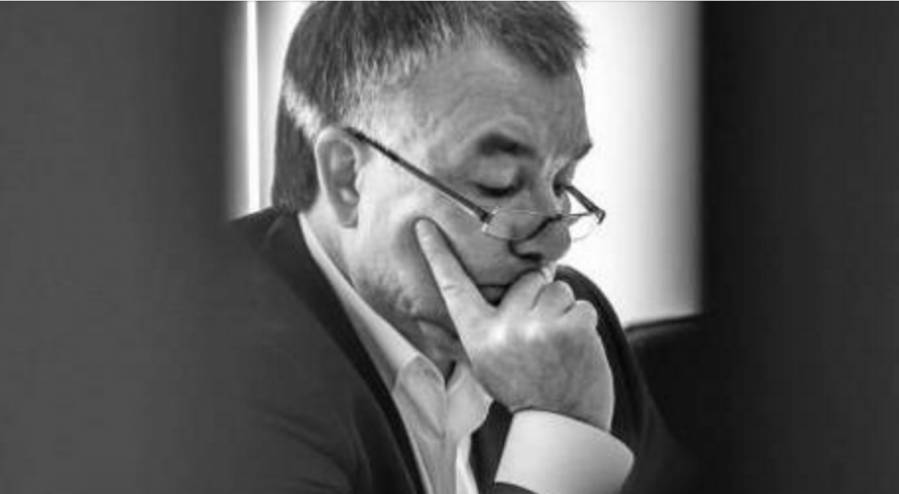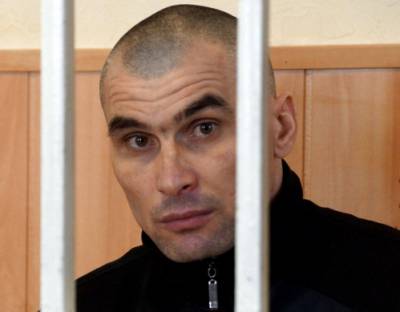A Loss for Ukraine and One Tortured Ukrainian Political Prisoner

Viktor Parshutkin, a Russian lawyer who became well-known in Ukraine for forcing Russia to withdraw falsified charges against Ukrainian political prisoner Serhiy Lytvynov has died suddenly in Moscow at the age of 57.
Russian colleagues say that Viktor Parshutkin was considered a leading expert on trial by jury, and also took part in masterclasses organized by Russia’s Federal Chamber of Lawyers. Those who knew him mainly in connection with his superb defence of a tortured Ukrainian political prisoner saw a caring person who went out of his way to help his client – and succeeded! Not totally, but that was because of the weight of the machine he was fighting on Lytvynov’s behalf.
Serhiy Lytvynov is one of several Ukrainians who were abducted and / or arrested by Russian enforcement officers during the first months of Russia’s undeclared war against Ukraine. Most were held incommunicado for many months while ‘confessions’ were extracted from them. Lytvynov was originally supposed to be part of a grandiose ‘war crimes trial’, probably also involving Nadiya Savchenko, who had been captured by Kremlin-backed militants in the Luhansk oblast, and supposedly implicating Ukraine’s leaders.
It was thanks to Viktor Parshutkin and Ukrainian civic activist Maria Tomak that the Russian Investigative Committee’s plan went so badly wrong.
Parshutkin agreed to represent Lytvynov, then a 32-year-old cowherd from a village in the Luhansk oblast who had been forced to cross the border into Russia in August 2014 because of a badly inflamed tooth. The nearest Ukrainian clinics had by then been seized by Kremlin-backed militants. He ended up in a hospital across the border in the Rostov region in Russia, where he was placed in a Russian ward with militants fighting in Donbas. After receiving treatment for the inflammation, Litvinov was placed in a ward with wounded Kremlin-backed militants from the self-proclaimed ‘Luhansk people’s republic’. They got it into their head that he was a Ukrainian volunteer and presumably ‘reported’ him. Three men in camouflage gear and masks turned up at the hospital and took Litvinov away. They suspended him from a tree and connected an electric current to his arms and legs; fired shots next to his ear; and slashed his thigh with a knife, as well as hitting him in the chest, stomach and around the head. Under such torture, he was willing to sign all the ‘confessions’ to multiple war crimes which he was supposed to have committed as a member of the Dnipro volunteer battalion.
The Investigative Committee’s announcement of the charges on Oct 1 made it clear that his ‘confessions’ were supposed to be used as ‘proof’ of Ukraine’s “‘genocide against the Russian-speaking population in Donbas”.
Using information gathered by Ukrainian activists and the Prosecutor General’s Office, Parshutkin succeeded in proving that neither Lytvynov’s alleged victims, nor their addresses, had ever existed.
Most incredibly, he even extracted admission that Lytvynov had been tortured in order to extract his signature on lurid and fictitious stories of rape and murder, and his right to rehabilitation (a formal apology and compensation).

The Investigative Committee had already held Lytvynov prisoner for almost a year and were not willing to release him. A Russian national, Alexander Lysenko, suddenly appeared and claimed that Lytvynov, together with two unidentified Ukrainian soldiers, had robbed him at gun point. Lytvynov was supposed to have burst into a house, armed with a machine gun, beaten up Lysenko and stolen two cars. There was literally no proof of Lysenko having entered Ukraine legally. While the cars did exist, neither was registered as belonging to Lysenko and one had long been scrap metal when it was supposed to have been ‘stolen’ (more details here).
There was effectively no attempt to make the charges seem plausible and Parshutkin demolished every aspect of this new ‘case’ in court, yet Lytvynov was still sentenced on April 20, 2016, to 8.5 years’ imprisonment. The Memorial Human Rights Centre responded by declaring Lytvynov a political prisoner and demanding his immediate release.
Parshutkin did not stop at that point. Using the acknowledgement of torture (which he himself said was an inexplicable spurt of honesty from the investigators!), in June 2016, he lodged an application on Lytvynov’s behalf demanding a formal apology for his unlawful prosecution. This was to be one of three legal suits, since Parshutkin also demanded compensation for the torture, and planned a defamation suit against the pro-Kremlin Rossiya TV channel and its notorious deputy director Dmitry Kiselyov, which had produced total lies about Lytvynov’s supposed murder and rape of 39 victims, including elderly women and young girls.
Parshutkin managed to wrench out an apology and compensation, albeit of an insultingly symbolic nature.
While world headlines focused on the grotesque ‘trial’ of Nadiya Savchenko, Viktor Parshutkin quietly continued his defence of a lesser-known Ukrainian victim of grave injustice.
He will be greatly missed.





